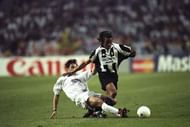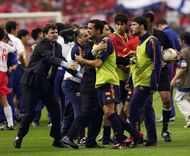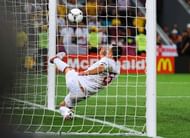The debate surrounding the use of video technology in football is one that continues to rage on with every season and every controversial call from a referee. Could it really be introduced to decide calls other than goal-line decisions? Would it really slow the game down to a crawl as some fans worry? How would players react?
There are a myriad of questions but one thing is certain: there are some huge calls in football history that may have gone the other way if video technology had been used, and the course of football history may well have been changed if that were the case.
Here are ten examples of historic football moments that video technology could’ve changed.
#1 Geoff Hurst’s second goal in the 1966 World Cup final
It’s the most famous moment in English football history, pretty much. The 1966 World Cup final, contested between England and West Germany at Wembley, was deadlocked at 2-2 when the final whistle blew. Extra time would be needed to separate the two teams.
With 11 minutes gone, England were on the front foot, and when Alan Ball put a low cross into the box, Geoff Hurst swivelled and hit a right-foot shot that struck the underside of the bar and then bounced downwards towards the line before being cleared. The England players claimed a goal and after some discussion between the Swiss referee and the Russian linesman, the goal was officially declared.
Modern studies of the film, however, have shown that the ball never fully crossed the line – meaning the goal was most likely not legitimate. How much history could’ve been changed had the goal not been allowed is up in the air – Hurst went on to complete a hat-trick and England won 4-2 – but who knows if that would’ve been the case had the Germans not been forced to push forward later in the game?
In the end, England ran out winners but seemed to have used all of their footballing karma in the incident, which video technology may have changed.
#2 Diego Maradona’s ‘Hand of God’
The 1986 World Cup quarter-final between England and Argentina remains one of the most talked about games in football history, mainly due to the two goals scored by Diego Maradona.
The second is recognised as possibly the greatest goal in football history – a wild dribble from the edge of England’s half – but the first was more controversial. The first half ended 0-0, and six minutes into the second half, Maradona initiated an attack that ended when England defender Steve Hodge sliced at the ball, causing it to fly wildly into the air.
Maradona, who had continued his run into the box, leapt into the air to contest the ball with England keeper Peter Shilton, who was much taller than the Argentine. Somehow though, it appeared that Maradona had reached the ball first and headed it into the net.
Replays would confirm however that the Argentine had in fact punched the ball into the goal with his left hand, a move which he labelled the “Hand of God”. It was a clever con that hoodwinked the officials but video technology would’ve caught it out and Maradona may well have been shown a red card.
Without him, Argentina surely would’ve crumbled, and the course of history would’ve changed dramatically.
#3 Real Madrid in the 1998 and 2016 Champions League finals
Real Madrid are the most successful club in European history, winners of a record 11 European Cup/Champions League titles. But it could be argued that two of those wins were illegitimate.
Firstly, the 1998 final against Juventus. Real came into the match as underdogs – they hadn’t won the tournament in 32 years and the Italian giants were appearing in their third successive final.
The game was deadlocked heading towards 70 minutes and extra-time beckoned, but when a long cross was cleared by the Juve defenders, Roberto Carlos fired the ball back into the box and Predrag Mijatovic pounced, rounding the keeper to poke the ball into the net. Replays would show, however, that he was clearly offside, a fact missed by the German officials. It turned out to be the winning goal.
In 2016, history repeated itself; this time Real were playing local rivals Atletico Madrid, and took the lead in the 15th minute when a goalmouth scramble following a Toni Kroos free-kick saw a clearly offside Sergio Ramos poke the ball home. Atletico did manage to equalise, but lost in a penalty shoot-out.
Would Real only have 9 European cups rather than 11 had video technology been used? Quite possibly.
#4 Sol Campbell’s disallowed England goals in 1998 and 2004
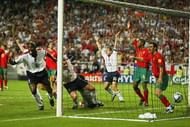
Refereeing decisions cost England in the 1998 World Cup and the 2004 European Championships and both incidents involved defender Sol Campbell.
In 1998, with their second-round match against Argentina on a knife-edge at 2-2, England won a corner on 80 minutes. Darren Anderton’s cross was headed in by Sol Campbell, but the referee disallowed it as he felt that Alan Shearer had impeded Argentina keeper Carlos Roa. Replays seemed to show this was not the case, but despite surviving extra time with ten men, England went on to lose a penalty shoot-out.
It was the same old story in Euro 2004. This time the game was 1-1 in the last minute of normal time when David Beckham fired a free-kick into the box. Michael Owen headed against the bar, and in the ensuing scramble Campbell once again headed home and thought he’d got the winner. This time – again wrongly, judging by the replay – the referee disallowed it as he felt that John Terry had impeded keeper Ricardo.
Both incidents remain controversial to this day and in both cases, video replays would’ve confirmed Campbell’s goals were legitimate and probably sent England through in both ties.
#5 Helguera and Morientes’ disallowed goals for Spain in the 2002 World Cup
Arguably the most questionable result in any modern game, the 2002 World Cup quarter-final saw host nation South Korea upset Spain via a penalty shoot-out to reach the semis. Realistically though it should never have happened.
Firstly Ivan Helguera headed in during the first half, only for the referee to disallow the goal due to apparent shirt pulling in the box. The decision was questionable at best – reminiscent of the Campbell incident in the previous World Cup – but worse was yet to come.
As the game headed into extra time – still under Golden Goal rules – Spain thought they’d won it again as Fernando Morientes headed in from close range, only for the referee to again disallow the goal. The reason this time? Apparently the ball had gone out of play before Joaquin fired in the cross. Only the replays confirmed it hadn’t. Spain were unable to get the crucial goal and ended up losing the penalty shoot-out to the hosts.
Was this match fixing? Or was it just an example of a really incompetent referee? We’ll never know, but video technology would’ve changed the result for certain and may have handed Spain their first World Cup eight years early.
#6 Luis Garcia’s “ghost goal” for Liverpool in the 2005 Champions League semi-final
After Chelsea and Liverpool had drawn 0-0 in the first leg of their Champions League semi-final at Stamford Bridge, everything was on the line in the return leg at Anfield.
It was Liverpool who ran out winners – and went on to win the trophy – but perhaps it should never have been the case. The game was decided by a Luis Garcia goal in the fourth minute of the first half, but it was a huge question mark, to say the least.
A flick from Steven Gerrard found its way to Milan Baros, who lobbed the ball over Petr Cech. It didn’t find its way to goal, until Luis Garcia rushed in and looked to poke home, only for William Gallas to manage a last-ditch goal-line clearance.
Video replays appeared to confirm that Gallas had saved the day, but the referee adjudged that the line had been crossed, much to the chagrin of Chelsea boss Jose Mourinho. Liverpool held on to win the game 1-0 and made the final while Chelsea were left to curse their luck.
Who knows what would’ve happened had video technology been used and the goal been disallowed? Maybe we would never have seen Liverpool’s ‘Miracle of Istanbul’.
#7 Thierry Henry’s handball sends France to World Cup 2010
This one was truly scandalous and it remains a mystery how the referee didn’t spot it. France and the Republic of Ireland were facing off in a 2009 play-off match to determine which team would make the 2010 World Cup, and after France had won the first leg 1-0 in Ireland, the Irish needed to win in St. Denis to qualify.
A Robbie Keane goal midway through the first half meant Ireland had equalised on aggregate, and so the match went to extra-time. Late in the first half, Florent Malouda lofted a free kick into the box towards Thierry Henry, who controlled it with his left hand before poking a cross over for Gallas to nod home.
The replays made the illegal handball pretty obvious, and Henry himself admitted to the foul after the game. The referee allowed the goal to stand though and France were given their ticket to South Africa, despite a lot of protesting from the Irish FA, including the proposal of a rematch.
With video technology, there’s no way the goal would’ve stood and so it could’ve been Ireland, not France, who went to the first African World Cup.
#8 Four denied penalties rob Chelsea of the 2009 Champions League
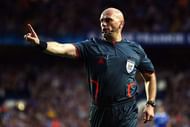
Four years after Luis Garcia’s ghost goal, Chelsea found themselves mired in controversy in the Champions League semi-finals again, this time against Barcelona. Again, the tie was on a knife-edge going into the second leg after a 0-0 first leg at the Nou Camp.
Chelsea took the lead early on through a Michael Essien goal and remained on top through the remainder of the game, but they were unable to gain a further lead – mainly due to the questionable performance from referee Tom Henning Ovrebo.
The Blues had four clear penalty claims denied – firstly Florent Malouda and then Didier Drogba were both bundled over in the box, only for Ovrebo to allow play to continue. Worse, in the second half, the Norwegian official somehow missed a clear handball from Gerard Pique.
Finally, in injury time, Andres Iniesta equalised, putting Barca ahead via away goals. And even after that, to rub salt into Chelsea’s wounds, another handball – this time from Samuel Eto’o – went ignored, sending Barca through to the final.
Chelsea’s players were incensed – Didier Drogba famously went on a foul-mouthed rant at a TV camera post-match – but the result stood. With the use of video replays, though? There’s no doubt that Chelsea would’ve emerged winners.
#9 Frank Lampard’s ghost goal for England against Germany in the 2010 World Cup
Bad luck once again haunted England in the 2010 World Cup. Faced with old rivals Germany in the second round, they had started badly, going down by two goals in the first half and it looked like it would be Germany’s game.
Suddenly though, the tide turned when defender Matthew Upson headed in a Steven Gerrard cross. It was 2-1 and now England were on the front foot, pressing for an equaliser against the shell-shocked Germans. Another attack led to a speculative shot from Frank Lampard from the edge of the box, and the ball flew over Manuel Neuer and hit the bar, appearing to bounce down into the goal.
Somehow, though, the referee and his linesman decided the ball hadn’t crossed the line – despite the replays showing that it was in by a massive margin. The first half ended with Germany in front and supposedly – after being shown a replay – the Uruguayan referee was horrified and asked, “oh my God, what have I done?”
Germany went on to win the game 4-1, clinically taking England apart, but going into half-time at 2-2 rather than 2-1 could’ve been the difference England needed to change things in the second half.
#10 John Terry’s goal-line clearance sends Ukraine packing at Euro 2012
Another controversial call involving England, but this one actually went in their favour. Going into their final group game with hosts Ukraine at Euro 2012, both teams were looking for a win in order to cement their place in the knockout stages, although Ukraine were in the more desperate position, as England had four points to their three.
England took the lead in the second half thanks to a close-range header from Wayne Rooney, but they were not playing well and Ukraine were looking to peg them back. With half an hour remaining, a shot from Marko Devic looked to have beaten Joe Hart, only for John Terry to dive in and hook the ball out before it crossed the line.
The only problem? The replay appeared to confirm that Terry had been too late and the ball was behind the line when he cleared it. The referee thought otherwise though and didn’t give the goal, which meant Ukraine lost the game 1-0 and were eliminated.
Although a draw would not have been enough for Ukraine – they would’ve lost out to France via goal difference – video technology allowing the goal could well have buoyed their spirits and allowed them to beat England, which would’ve put them through.
